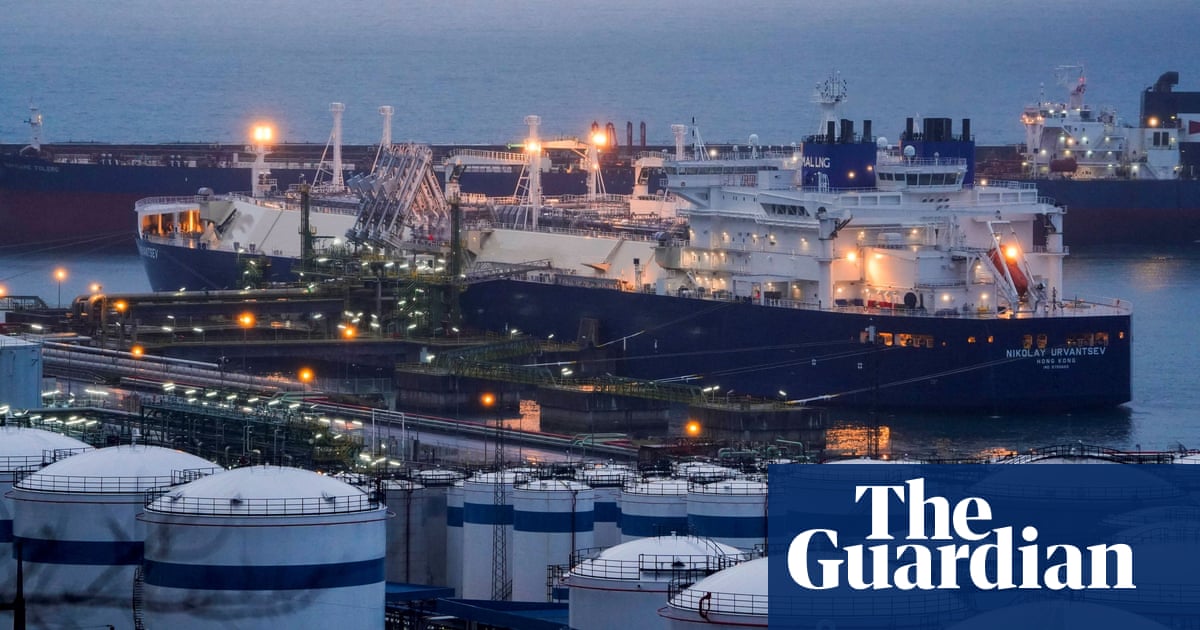
Britain and the US together moved to ban Russian oil on Tuesday in the biggest financial crackdown on Moscow since its invasion of Ukraine two weeks ago.
In a move likely to hit the Kremlin’s coffers hard, as well as further raise petrol prices and feed inflation in the west, Boris Johnson said stopping imports of Russian oil by the end of 2022 was “another economic blow to the Putin regime”.
Joe Biden announced a joint ban on Russian oil and gas imports, while the EU presented a plan to phase out gas imports only.
“Today I’m announcing the United States is targeting the main artery of Russia’s economy,” President Biden said in an address at the White House.
“We’re banning all imports of Russian oil and gas and energy. That means Russian oil will no longer be acceptable at US ports, and the American people will deal another powerful blow to Putin’s war machine.”
The sanctions are expected to be highly damaging to the Russian economy, with experts at the Energy and Climate Intelligence Unit saying the UK oil ban alone could cost Moscow more than £5bn this year.
The EU sources about 40% of its gas from Russia and 27% of its oil, while the US gets no gas from Russia and 7% of its oil. In Britain, 4% of gas and 8% of oil comes from Russia.
Analysts said the crackdown was expected to push up the price of fuel, with petrol already hitting a record 155p a litre this week in the UK, 24% higher than a year ago. Conservative MPs are clamouring for a reduction in fuel duty in this month’s spring statement as a result.
Johnson said consumers would be protected and the government said the transition to new suppliers of oil would be “smooth”, implying motorists have no need to queue at the pumps in a repeat of the autumn’s panic over fuel.
The Department for Business, Energy and Industrial Strategy (BEIS) said the UK imports 13% of its diesel from Russia, and none of its petrol.
Johnson said: “We can certainly do it … in a way that doesn’t disrupt supply, that ensures we have substitute supplies on stream in an orderly way and in a timetable that won’t affect UK business, won’t affect UK manufacturing, road haulage or other parts of our industry but will punish the regime of Vladimir Putin.”
But Susannah Streeter, senior investment and markets analyst at Hargreaves Lansdown, said: “With supply constrained, while demand rockets for supplies from elsewhere in the world, it seems the only way is up for energy prices.”
She added: “There is no magic wand to wave to speed up the shift to renewables, and although the EU has pledged to accelerate the process of weaning member countries off Russia, it’s going to be a hugely difficult and expensive transition.”
Analysts at Credit Suisse warned that if oil hit $160 a barrel, it could drive inflation to 9.5% by October and push the UK into recession.
The chancellor, Rishi Sunak, will come under pressure to take fresh action to protect consumers from the cost of living squeeze, with higher oil prices having an impact across the economy.
Announcing the plan, Kwasi Kwarteng, the business secretary, said he would establish a “taskforce for oil” to help companies. He said that the UK is a significant producer of oil, and alternative suppliers included “reliable partners such as the US, Netherlands and the Gulf”. Kwarteng also said he was “exploring options” for a total ban on Russian gas.
The government said Russian oil supplies would be “quickly” replaced by other suppliers as its products are already being ostracised by the market: nearly 70% of Russian oil currently struggles to find a buyer.
Labour backed the move. Ed Miliband, the shadow business secretary, said: “It is the right decision to ban imports of Russian oil. We need to do everything possible to isolate the Putin regime.”
BEIS is soon expected to publish an updated energy supply strategy including accelerated investment in renewables and a new round of North Sea licences to maximise extraction.
However, ministers remain deeply sceptical about fracking, which some Tories would like to see go ahead as the UK strives for energy independence.
Jacob Rees-Mogg, minister for Brexit opportunities, signalled support for a change in policy on Tuesday.
He called shale gas “very clean” and appeared to dismiss concerns about tremors caused by drilling, saying: “Some of the seismic effects are ones that can only be measured with sophisticated equipment. Others are equivalent to a bus passing by your house, assuming there’s a pavement in between you and the house. And as I say, it’s not the San Francisco earthquake.”
A BEIS source said fracking would not be restarted “until there is compelling scientific evidence that allows us to predict and manage earthquakes associated with it”. Some MPs in favour of fracking said it was possible the government could announce fresh research on its impact if they wanted to show it was being kept on the table.
The prime minister’s announcement of a ban on Russian oil was relatively abrupt given his comments on Monday that the west would have to take a phased approach to reducing reliance on Moscow’s oil and gas.
European countries including Germany, which is much more heavily reliant on Russian gas in particular, have been reluctant to move rapidly towards phasing it out.












